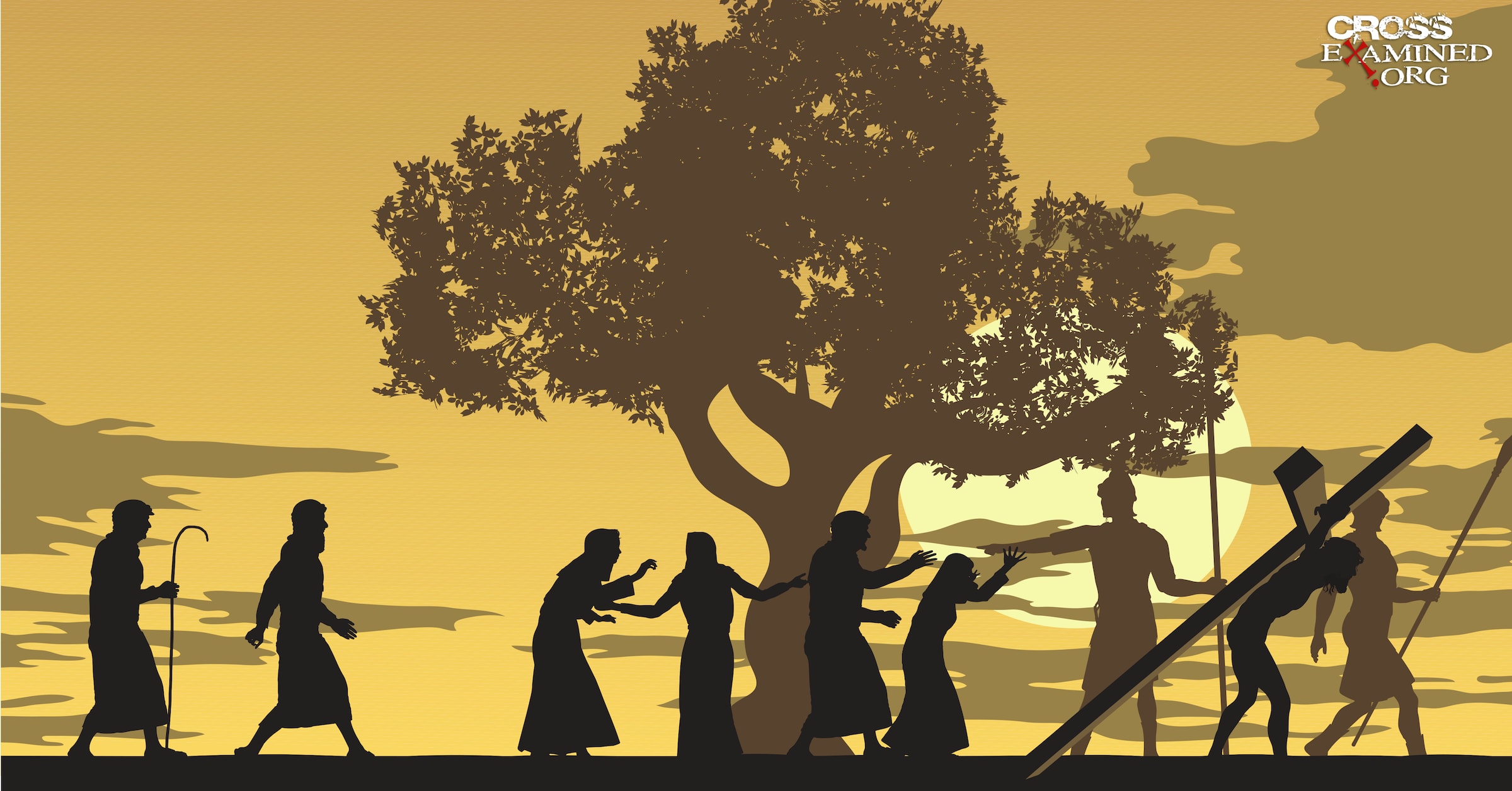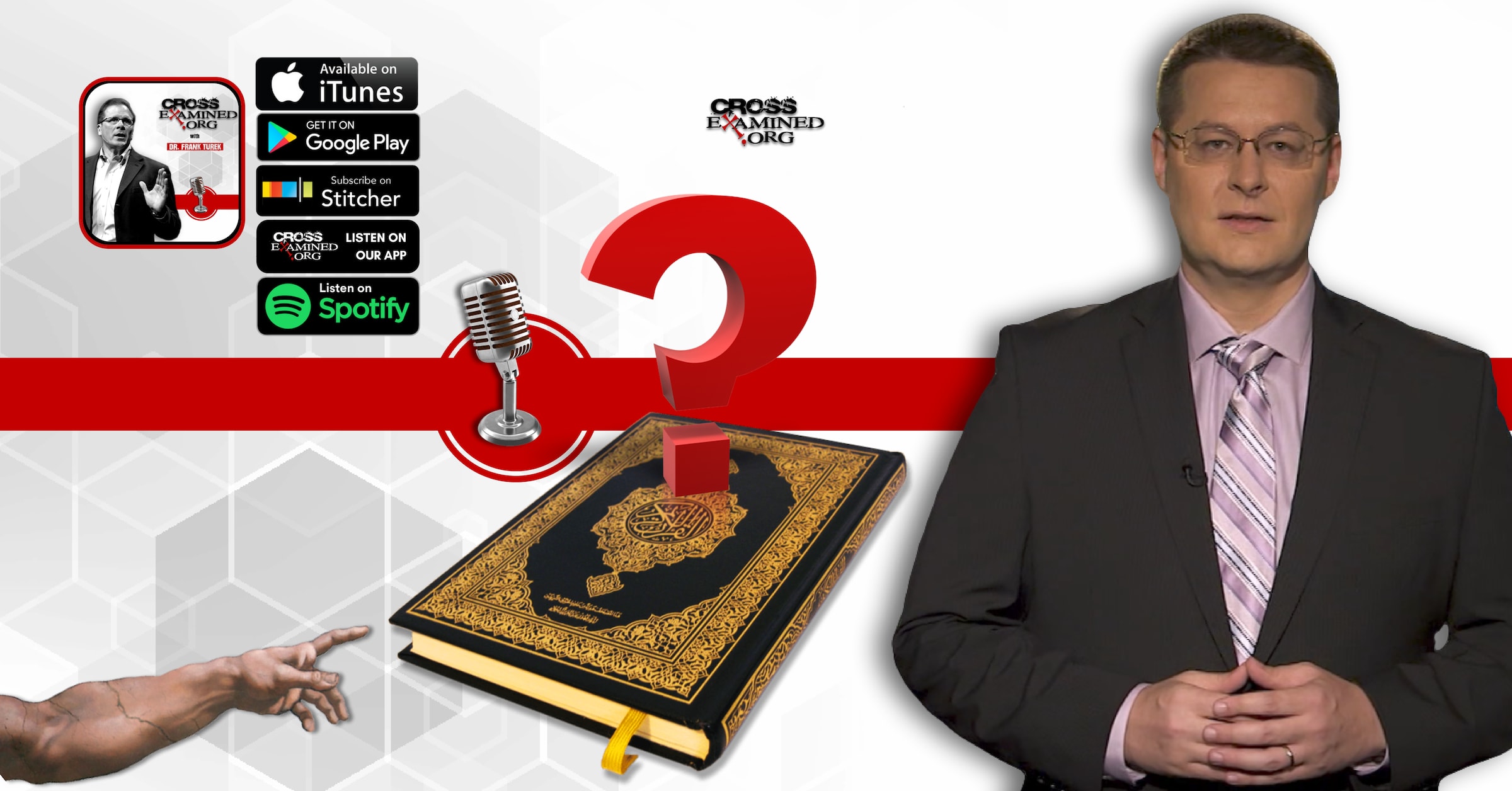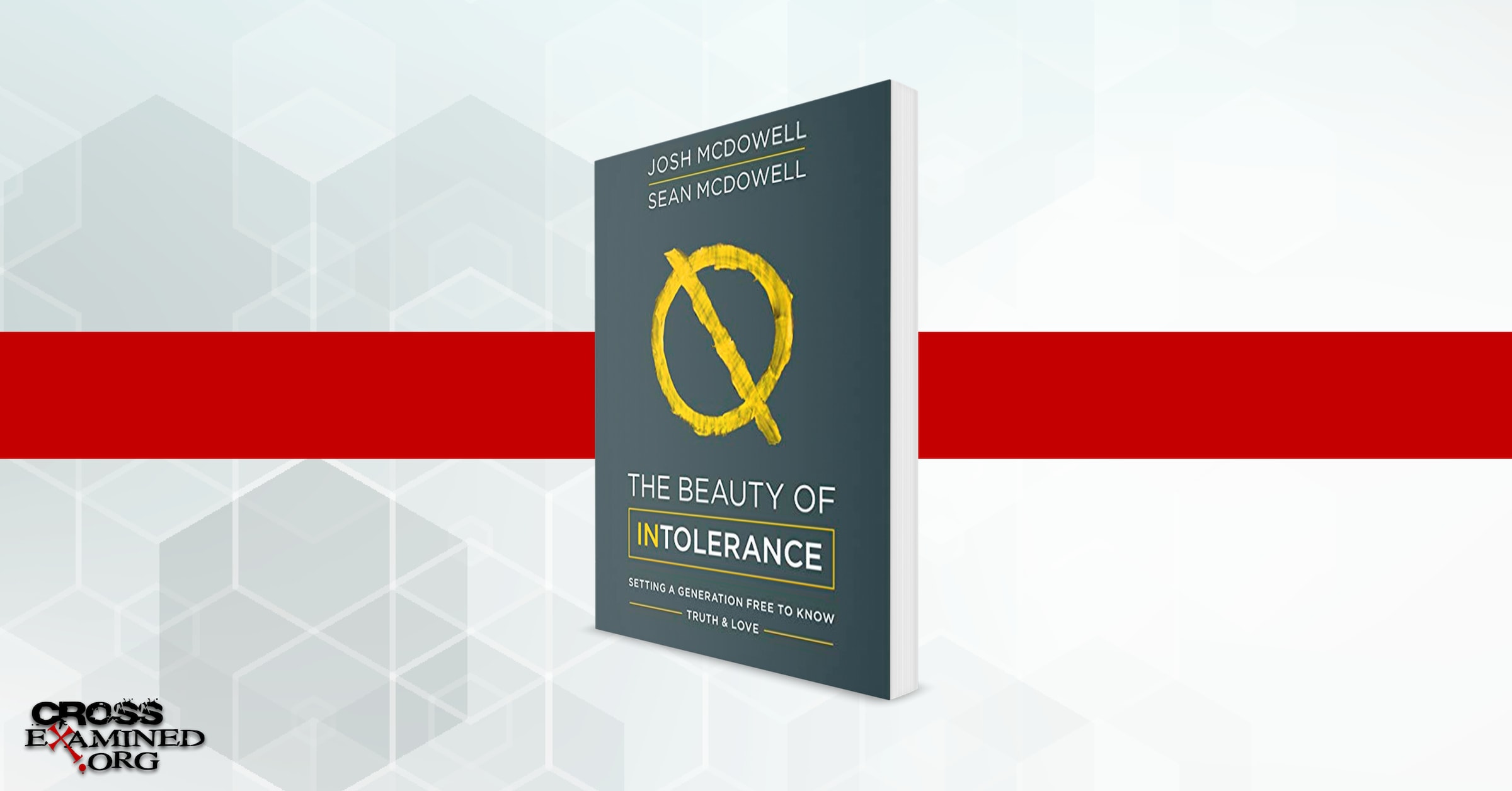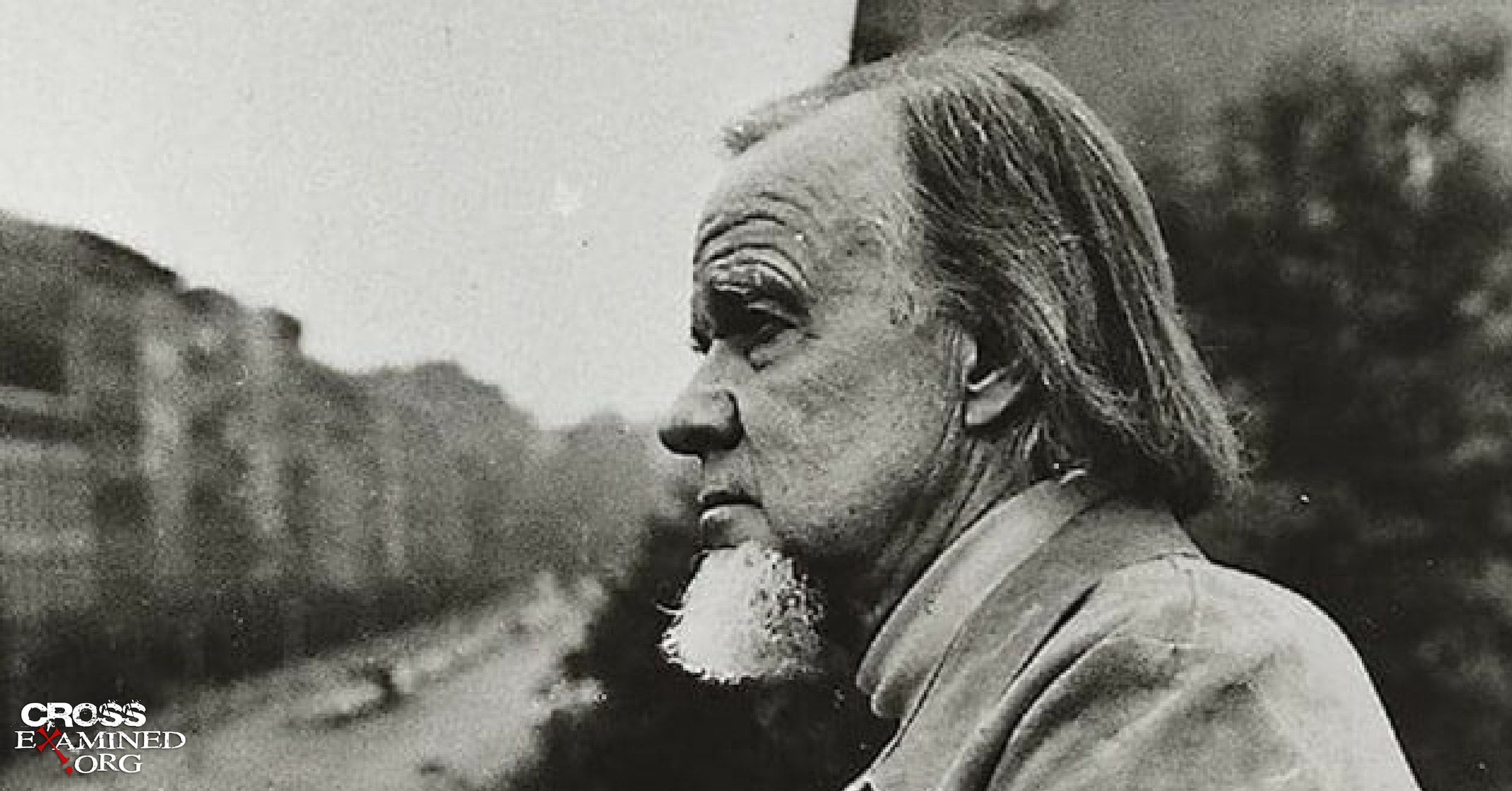By Luke Nix
Introduction
A few years ago, Sean McDowell gave a talk at the AMP Conference called “The Beauty of Intolerance.” In the talk, he spoke of two different views on tolerance that seem to be clashing in today’s society. He explained how the differences explain much of the political rhetoric of “hate” and “phobias” and “intolerance.” He focused specifically on the Church’s speaking truth in love and how this view is actually the most tolerant. This talk has been one of my favorites for a while. I discovered shortly after I first saw the talk that Sean and his father, Josh McDowell, coauthored a book, “The Beauty of Intolerance,” that went into the topic much deeper and focused on how Christian parents can effectively communicate moral truth to a morally relativistic generation. As a parent and one who defends the objectivity of morality (and, thus, the existence of God), this book was one I dare not pass on reading, which turns out was an excellent decision. Now, before I get to my usual chapter-by-chapter summary review and the remainder of my thoughts, here is the talk by Dr. Sean McDowell that originally caught my attention.
Chapter 1: True for You but Not for Me
The book begins with a fictional conversation between a college student coming home for the holidays and her parents. She and her boyfriend are expecting to be able to stay together in the same bedroom but her parents will not permit it. Both sides get into a heated discussion about morality and tolerance. The daughter wishes her parents to respect her moral decision and allow it even though they disagree, and her parents expect her to maintain the morality she grew up with. The conversation is designed to highlight the differences between the generations regarding the view of morality and tolerance. Josh and Sean McDowell use this as a springboard to begin their investigation into how the generations can respect one another yet still be guided by an objective moral compass.
They begin by pointing out that the different generations tend to recognize different sources for moral truth. One source of truth is God’s nature. It is objective and applies to every person whether they recognize it or not. The second source of moral truth is the individual. It is subjective and applies only to the person who maintains that particular view. The source that a person appeals to will not only affect the moral decisions they make, it will also affect their definitions of many words and phrases. Terms such as “tolerance” and “acceptance” are defined according to the source of moral truth. Drs. McDowell show the differences between the definitions of these words and several others. The two sources of moral truth often clash, and that is what causes much of the tension between the generations.
Chapter 2: When Tolerance Doesn’t Mean Tolerance
The second chapter starts with another fictional conversation; this one is meant to illustrate the difference between two radically different views of tolerance. The authors label the two views as “Traditional Tolerance” and “Cultural Tolerance.” They explain that Traditional Tolerance is grounded in the idea that morality is objective. This means that something is right or wrong whether someone believes it to be that way or not. It applies to all people in all cultures at all times. It has a hierarchy of morality that places some behaviors over others in objective goodness and truth value. Tolerance in this view means that even though people may not agree with another’s views, they are still to respect the other’s views and their decision to live by those views. Essentially, Traditional Tolerance is to love and respect the person despite what they believe and do.
Cultural Tolerance, on the other hand, is grounded in the idea that morality is relative and subjective. Morality is to be determined by the culture or the individual and does not apply equally to all people in all cultures at all times. Nor does this view hold a hierarchy of morality that places the goodness or truth value of one over another. In this view of tolerance, all behaviors and beliefs are equally good, equally true, and should be equally accepted by all people in all cultures at all times. Essentially, Cultural Tolerance is to celebrate the person’s behaviors and beliefs regardless of what they believe and do.
Chapter 3: The Irony: Intolerance in the Name of Tolerance
Ironically, many of those who hold to the cultural view of tolerance end up violating their own view in that they not only refuse to celebrate but instead condemn those who behave and believe differently from them. Yet, these same people do not believe themselves to be in such violation. So, who is truly being intolerant of whom, here? Josh and Sean explain that to answer this question, a standard of morality (thus tolerance) must be recognized by both sides. Just as claims of truth about reality must be tested against the standard of reality, truths about morality must be tested against the standard of morality. The source of morality that all humans are subject to (and can answer this question) is the biblical God. They explain that morality that is grounded in God is not decided by God moment-by-moment but is grounded in His nature. God does not decide what is good and true; He is what is good and true.
There was a point in history when God, as the standard of morality, was accepted in general by western culture, but it has slowly changed over the centuries. The authors take the reader through different periods of time that gradually brought in the change- the Renaissance, the Enlightenment, the Industrial Revolution, Darwin’s publication of his book on evolution, and modern rapid technological advancement. They explain how in these periods of time the source for answers in the culture gradually shifted from God to man, encouraged by many legitimate recognitions and much progress in the arts and sciences. However, despite the advancements in these areas, philosophy was regressing from recognizing the existence of objective moral truth to settling for subjective moral truth. This “modernist” philosophy is what many in the culture have adopted today and is the source for the cultural view of tolerance.
Chapter 4: When Anything Goes
Because God is no longer seen as the source of objective moral truth, the Bible cannot possibly contain objective moral truth. In the rejection of objective moral truth by this new culture, the Bible has become more of a “self-help” book. One that is not taken to have any objective truth, but one that is to be subjectively interpreted and applied where the reader is comfortable. Because there is no source by which to judge one action as “good” and another as “evil,” anything goes. Anything and everything a person wishes to do can be considered “good.” Everything from the beheadings carried out by ISIS to the dismemberment of babies moments before they are delivered into this world–all of these behaviors cannot be judged as objective evil because it is the culture, not a source above the culture that determines what is good and what is evil.
Further, because there is no objective “good” or “evil,” what is to be made of injustice? Without an objective standard by which to judge actions, what is “just” and “unjust” cannot be identified either. What we observe and positively identify as “unjust” cannot truly be considered unjust when differing cultures believe that opposite behaviors are “good.” This is one of the many ways that the idea of cultural tolerance goes against our better judgment as human beings. We know that certain actions are objectively evil, and we want to fight to right the wrong and see that injustice is stopped. The authors take the reader back to the early Church and point out that their intolerance of the injustices of the Roman Empire (leaving unwanted children in the streets to die) was objectively evil. No one, who holds to the cultural view of tolerance, can consistently believe that any act is evil or unjust. When they make such a claim of true evil and injustice, they are borrowing capital from the traditional view of tolerance.
Chapter 5: Love Makes It Right
One of the major tenants of the cultural view of tolerance is that love makes everything right. The way that this is expected to be applied is that if you love someone you will affirm whatever behavioral choices they make, no matter how strongly you disagree with them. While Drs. McDowell do agree that love does make right, they highlight the fact that cultural tolerance forces a truncated definition of love, one that focuses merely on the current feelings of the loved one and not their future wellbeing. The one who loves should not affirm a destructive behavior in the name of “love;” for to do so would be to send the “loved” one to their own destruction. This is the exact opposite of the goal of the person who loves them. By not including the future wellbeing of the loved person, cultural tolerance turns love upside down.
The authors explain that the biblical love that one must show involves the ideas of cherishing and nourishing the other person. And in the context of romantic love, one must cherish and nourish the other as they do themselves. These involve not just the present moment but also guarding against things that can hurt in the future and promoting things that will grow the person in the future. The marriage commitment is a commitment to cherish and nourish the spouse. The authors began the chapter with a fiction conversation between two parents and their daughter who wished to be affirmed in her sexual relationship with her boyfriend because they are in love (a fairly common situation in today’s world where the parents’ ideas of traditional tolerance and the children’s ideas of cultural tolerance are at odds). The problem is that the love protects security and commitment, which neither are in place because no commitment has been made between the boyfriend and girlfriend. To claim “love” at that point in their relationship is truly inaccurate, thus to have sexual relations would actually contradict what love is, and for the parents to affirm the relationship would also contradict their love for their daughter.
Chapter 6: True Love
But how do parents deal with such a situation? If they press too hard, they risk alienating their daughter. Can the truth be spoken and love demonstrated in such a way that the daughter can accept it and appreciate it? Josh and Sean emphasize the difference between “doing” and “being.” They explain that every person is created in God’s Image and that gives them intrinsic worth. They also explain that every person is sinful by nature, so that means that they will make wrong choices. Further, the environment and even some genes may make certain choices more difficult for some people than others, but we are still responsible for our choices. This makes for a legitimate distinction between who a person is and what they do. This is the view of traditional tolerance- Personal worth and personal choices are judged independently of the other. Cultural tolerance does not allow such a distinction, so it holds that judgment of one necessarily judges the other the same. To illustrate the beauty and importance of this distinction, the authors take the reader through Jesus’ encounter with the woman at the well in John 4. Jesus showed this culturally outcast woman love, respect, dignity, and value, yet he called out her sin- a message that she understood (as evidenced by her reaction) to be loving.
Chapter 7: Know the Truth and Speak It in Love
Every loving parent desires to protect their children from harm. The traditional view of tolerance allows a parent to love their child AND protect (or attempt to protect) them from harmful behaviors, where as the cultural view does not. A truly loving parent wants what is best for their child, and if they do not recognize that the child is making a wrong decision yet they do not address it and allow them to continue on the path, the “love” comes into question. Again, the traditional view of tolerance is quite intolerant of wrong choices yet alerts the person out of love and concern- that is beautiful. Ironically, the cultural view requires that even if a harmful decision is identified that we must permit and even encourage continuing on the harmful path. This is NOT loving and is NOT beautiful. Even though a parent may disagree with a child’s beliefs or behaviors, the traditional view of tolerance allows them to lovingly guide them away from harm.
To conclude the chapter, the fictional conversations that began the previous chapters were revisited. This time the conversations were guided by the parents’ intentional purpose of communicating their disagreement in the context of their desire for what is best (true love- the traditional view of tolerance) and keeping the lines of communication open about the wrong decisions. The new versions of these conversations were successful in keeping minds open and love being communicated. The authors caution that even though these fictional conversations seemed almost effortless, that in reality they require much patience and a long-suffering heart. Sometimes such a parent will be required to walk through the “hometown” of those who they disagree with in order to demonstrate their love and willingness to properly understand where that person is coming from to appropriately communicate the truth that their decision is, in fact, wrong.
Chapter 8: Cultural Tolerance and Education
The cultural view of tolerance is not just an idea that some people in society possess; it has permeated everything from education to government to the Church. The effect on the education system is quite evident when the cirricula are examined. Every subject, from math to history is taught through the lens of cultural tolerance. In many cases, the education system goes so far as to teach that if something cannot be tested then nothing about it can be known factually. Because many different cultures believe certain things that cannot be tested, it is taught, not only that these beliefs have not factual value but, that they are merely opinion, and students must simply accept that.
This is projected onto the students as well. They are taught that their thoughts, feelings, and beliefs have no claim on truth over another student’s thoughts, feelings, and beliefs. According to modern education, these are all just the product of opinions, and everyone needs to accept and even celebrate everyone else’s opinions. The authors are careful to emphasize that not every teacher is attempting to indoctrinate our kids; however, they do recognize that there are many in the system who are and who do so quite aggressively. This caution is provided not to cause alarm and to pull our kids from the public education system but to encourage us as parents to recognize that we are responsible for our kids’ education and that means that we need to prepare our kids at home to understand that and how such views are incorrect.
Chapter 9: Cultural Tolerance and the Government
Cultural tolerance has also greatly impacted governments in the West. But this is not to be a surprise for the Christian, for there are two kingdoms: the earthly kingdom and the Heavenly Kingdom, each having its own standards. Most of the time, both kingdoms’ standards are similar enough that Christians can live both objectively right and legally right at the same time, but if it ever comes to the time in which they are in conflict, the Christian must follow the Heavenly Kingdom because it is the one that holds to the objective standards that even earthly governments are supposed to follow. Our allegiance should lie with God, the foundation of objective moral truth; not the government, which is subject to the foundation of objective moral truth.
But how are we to respond when the time comes that the relative laws of the land come into conflict with the objective laws of God (such as when same-sex marriage was legalized a few years ago)? Drs. McDowell emphasize that our response must not just be a factual one but one given in love- a love that tells the truth with the person’s best interest in mind and in the context of a loving relationship, with traditional tolerance, not cultural tolerance, at the heart of our communication.
Chapter 10: Cultural Tolerance and Society
Because of the impact that cultural tolerance and moral relativism have had on our society, it is quite common for parents to feel helpless. This feeling of helplessness is often the cause of heated exchanges between parents and their children that leave both sides feeling unloved and disrespected. However, parents can increase their moral impact in their children’s lives by continually reminding them that God ultimately has their best interests and purposes in mind (true love), and His moral commandments are given so that those interests and purposes can be realized in their lives.
How can parents guide their children in their moral choices and focus on God’s loving interests and purposes for their lives? Josh McDowell takes parents through his process of the 4-Cs that he expounds on even more in his book “10 Commitments for Dads,” which has now been added to this reviewers reading list. The 4-Cs are:
1. Consider the choice
2. Compare it to God
3. Commit to God’s way
4. Count on God’s protection and provision
By equipping our children with this process and how to use it, our children can successfully identify when cultural tolerance is guiding them in the wrong direction and can adjust accordingly to God’s perfectly loving interests and purposes for their lives. It is not only important that parents teach this process but model it in their lives, so that their children not only hear it but see it and its results in real-life situations with real people.
Chapter 11: Cultural Tolerance and the Church
One of the things that makes teaching the correct view of tolerance (the traditional view) so difficult is that some of the concepts of the cultural view of tolerance have infiltrated the Chuch. This is not something that was (or even is) intended nor is it something that was (or is) blatant. Church leaders, while holding strong to the inerrancy of Scripture, have unwittingly adopted some of the language of cultural tolerance which communicates the concepts contradictory to what the leaders intend to communicate. Josh and Sean McDowell look at five common phrases that we hear in today’s church that are problematic:
1. The Old and New Testaments are the Bible of the Jewish and Christian faiths.
2. The Bible contains truth designed just for me.
3. There are 101 ways to interpret the Bible.
4. What’s true for you isn’t necessarily true for me.
The Bible is God’s Word, but experience determines interpretation.
Each of those contains is partially true, but they also contain error. Each one, in its own way, implies that either Christianity is not true for all people across all generations and/or that truth is relative. It is important that parents recognize when the language is used and reinforce with their children and in their own minds where the truth is and how it can lead to error if not properly understood.
Chapter 12: You Can Make a Difference
In the concluding chapter, Josh and Sean offer three ways that Christians can be effective in our culture in changing the view of tolerance back to the correct view. They recount instances in their own lives where each one has been successful. They also recommend resources, beyond their own work, that the Christian can use in their efforts. They emphasize that there is no “silver bullet” that will convert a culture or even a single person. This is an effort that can take days, month, or even years. We are called not to convert people overnight but to patiently build truly loving relationships with them and show them the love of Christ not only in our words but also in our lives.
Reviewer’s Thoughts
“The Beauty of Intolerance” certainly did not disappoint. The conversational style (and conversations) that the McDowells used made this book’s deep philosophical ideas easy to comprehend and see how to apply in everyday life. The book keeps the reader engaged from beginning to end. As a parent, at nearly every turn of a page I discovered new ways to effectively communicate truth to my children and teach them how to discern moral truth from error in our relativistic culture. And as someone who discusses moral and political issues frequently with friends, family, and coworkers, I found the content to be extremely valuable. I, no doubt, will be referring readers of this blog back to this book in future posts.
As you can tell, I highly recommend this book for every Christian and especially Christian parents. Whether your kids are still at home or your children are now adults, this book will be invaluable for you and for them as you and they navigate through today’s culture. Once I got through the third or fourth chapter, I placed one of my Top 5 Books posts on hold simply to trade out one of the recommendations for this one. I also have the audiobook on MP3 CD and multiple copies to borrow out and give to fellow parents. Parents, DO NOT pass up this book; you will find it engaging and encouraging, and the philosophical and biblical insights throughout its pages will enhance your relationship with your kids and help you keep their eyes on Christ and remind them that God truly loves them by always having their best interests at heart.
Luke Nix holds a bachelor’s degree in Computer Science and works as a Desktop Support Manager for a local precious metal exchange company in Oklahoma.
Original Blog Source: http://bit.ly/2TlgYZa










